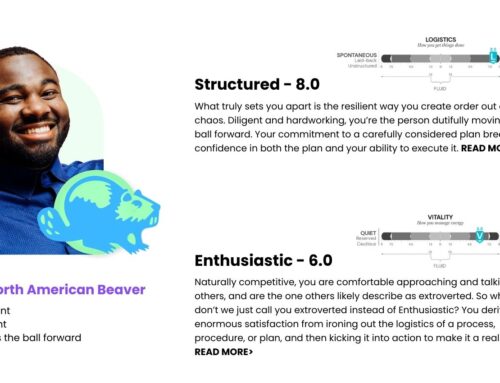How to Avoid ‘Putinizing’ Your Organization
Vladimir Putin’s disastrous decision to invade Ukraine was based on the same unconscious habit that has wrecked countless nations and organizations alike: allowing unexamined power to drown out any flickering hope for self-awareness and the reality checks that come with it.
While most of us mistakenly imagine ourselves to be self-aware (95% vs 10%), the consequences of leaders lacking self-awareness is of course disproportionate to their number. Just ask the tens of thousands of employees, investors, and account holders crushed by the folks who once led Enron, Theranos, and Lehman Brothers, respectively.
Carl Jung famously stated that until we drag our unconscious into the light, we’re doomed to blundering about in the dark and conveniently dismissing any adverse consequences to ‘fate.’
Which begs the question: how do so many people lacking in self-awareness end up in charge (and remain there, until it’s too late)?
The Perils of Experience and Power
In her years of research on self-awareness, Tasha Eurich, PhD, uncovered two common impediments to self-awareness. While all of us can fall pray to these blind spots, their very nature makes them especially problematic to leaders.
#1 Experience – Our experience gives us a false sense of confidence in our abilities or an equally ungrounded sense that we are a fraud. Picture here the leader who starts off on the right foot but, over time, grows over-confident in his abilities and becomes unable to accurately assess himself. Conversely, there is the leader who discounts the value of her contributions. In both cases, an absence of honest self-awareness hurts the organization.
#2 Power – The more famous of the two, power leads people to overestimate their sense of self-awareness. The old saying about ‘absolute power breeding absolute corruption’ could easily imply a corruption of one’s own senses of empathy, humility, and competence.
5 Steps to Improve Self-Awareness
So what’s a leader to do to ensure she or he increases their level of self-awareness (and doesn’t lose what they’ve already got)? Anthony Kim, in Harvard Business Review, recommends these 5 steps:
Meditate – Regularly take a moment or two here or there to re-center and find some clarity. The more harried and hurried, the more important this can become.
Articulate Goals – Write down what you want to accomplish and track your progress.
Take Assessments – Psychological assessments like our own ALIVE Big 5 and GAME assessments can provide startling insights into who you are, what motivates you, etc. Retaking them again a few months later can reveal progress or weak spots.
Ask Around – While 360 assessments are famous in the leadership circles of Fortune 500 organizations, they’re also time-consuming and arduous. Instead, establish a trusted group of friends, colleagues, and family you can routinely reach out to for a reality check. Insist on candor and don’t punish anyone when you get it.
Professional Feedback – Establish more formal processes at the office to ensure your counterparts, colleagues, and direct reports all agree with your own sense of self-awareness.
How to Avoid ‘Putinizing’ Your Organization
Vladimir Putin’s disastrous decision to invade Ukraine was based on the same unconscious habit that has wrecked countless nations and organizations alike: allowing unexamined power to drown out any flickering hope for self-awareness and the reality checks that come with it.
While most of us mistakenly imagine ourselves to be self-aware (95% vs 10%), the consequences of leaders lacking self-awareness is of course disproportionate to their number. Just ask the tens of thousands of employees, investors, and account holders crushed by the folks who once led Enron, Theranos, and Lehman Brothers, respectively.
Carl Jung famously stated that until we drag our unconscious into the light, we’re doomed to blundering about in the dark and conveniently dismissing any adverse consequences to ‘fate.’
Which begs the question: how do so many people lacking in self-awareness end up in charge (and remain there, until it’s too late)?
The Perils of Experience and Power
In her years of research on self-awareness, Tasha Eurich, PhD, uncovered two common impediments to self-awareness. While all of us can fall pray to these blind spots, their very nature makes them especially problematic to leaders.
#1 Experience – Our experience gives us a false sense of confidence in our abilities or an equally ungrounded sense that we are a fraud. Picture here the leader who starts off on the right foot but, over time, grows over-confident in his abilities and becomes unable to accurately assess himself. Conversely, there is the leader who discounts the value of her contributions. In both cases, an absence of honest self-awareness hurts the organization.
#2 Power – The more famous of the two, power leads people to overestimate their sense of self-awareness. The old saying about ‘absolute power breeding absolute corruption’ could easily imply a corruption of one’s own senses of empathy, humility, and competence.
5 Steps to Improve Self-Awareness
So what’s a leader to do to ensure she or he increases their level of self-awareness (and doesn’t lose what they’ve already got)? Anthony Kim, in Harvard Business Review, recommends these 5 steps:
Meditate – Regularly take a moment or two here or there to re-center and find some clarity. The more harried and hurried, the more important this can become.
Articulate Goals – Write down what you want to accomplish and track your progress.
Take Assessments – Psychological assessments like our own ALIVE Big 5 and GAME assessments can provide startling insights into who you are, what motivates you, etc. Retaking them again a few months later can reveal progress or weak spots.
Ask Around – While 360 assessments are famous in the leadership circles of Fortune 500 organizations, they’re also time-consuming and arduous. Instead, establish a trusted group of friends, colleagues, and family you can routinely reach out to for a reality check. Insist on candor and don’t punish anyone when you get it.
Professional Feedback – Establish more formal processes at the office to ensure your counterparts, colleagues, and direct reports all agree with your own sense of self-awareness.



